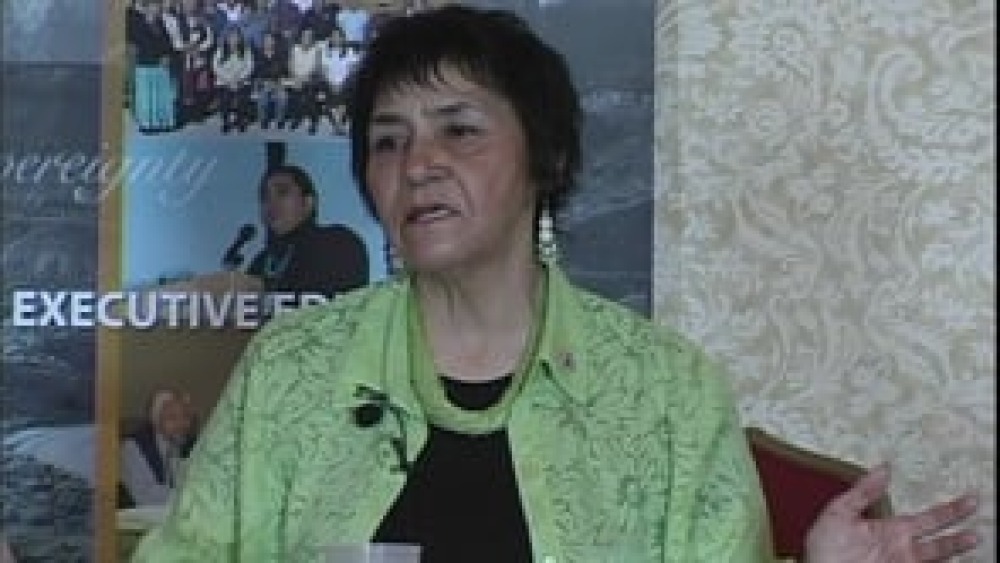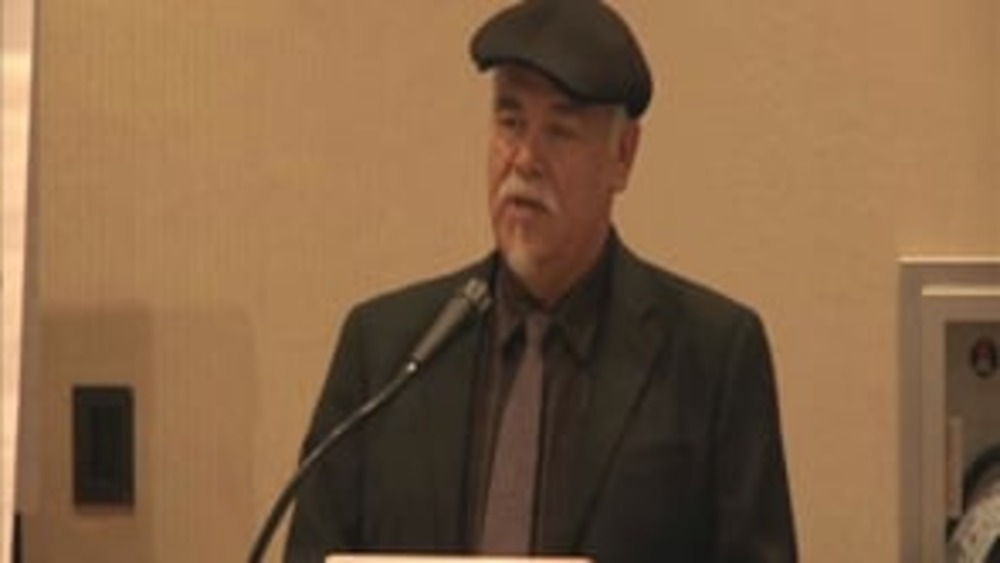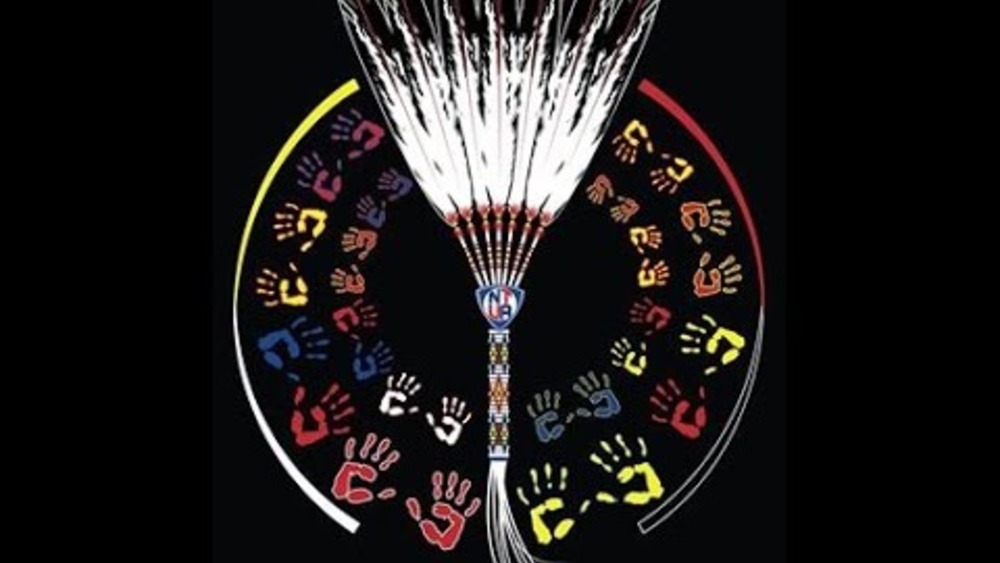Greg Gilham, Former Chair of the Blackfeet Nation's Constitution Reform Committee, discusses the process the committee developed to move constitutional reform forward.
Additional Information
Gilham, Greg. "Engaging the Nation's Citizens and Effecting Change: The Blackfeet Nation Story." Emerging Leaders seminar. Native Nations Institute for Leadership, Management, and Policy, University of Arizona. Tucson, Arizona. March 25, 2010. Presentation.
Transcript
"I do want to commend Erma [Vizenor] for her presentation because she's hit on a lot of issues that our process up in Blackfeet Montana is going through. And we're probably, I think, a third of the way into our entire process. We started in October of 2008. We were appointed, there were five of us appointed to a committee to sit on this committee and do constitutional reform for our program. I'll get into that a little bit, but with 30 years of law enforcement experience, putting handcuffs and shackles on people, I can tell now what they go through.
Our Blackfeet Nation has a land description that I want to go over; a million-and-a-half total acres of land. Our reservation sits on the Canadian border to the north and we're adjacent to Glacier National Park to the west. 400,000 acres are owned by non-Natives on the reservation. We have 500,000 acres owned by the tribe and 600,000 acres owned by members. We have resources that we're very, very proud of on our lands and we have 136,000 acres of timber. Some of it burned in the last couple of years. We have 28 freshwater lakes and we got a real good opportunity with Glacier National Park next door to have a very good tourism set up. But because of our constitution as it is now, we're not getting anywhere. We're not building a stable government, we're not bringing in industry or tourism or business. I just wanted to relate to that. We have 16,482 tribal members, all have to fall within that quarter-degree of Indian blood, and about 9,200 live on the reservation and about 7,300 live off.
We were organized under the Indian Reorganization Act of 1934 and it was adopted in 1935. Less than 10 years later our tribe was so concerned about this new IRA constitution that they requested a meeting with a Senate committee to try to address what they could do about this problem constitution that they were having to abide by. They were basically telling the Senate hearing that -- who by the way showed up by train and met with our tribal government then -- and their biggest concern was, 'What can we do to get ourselves out from under this new constitution, this new structure of government?' They basically said, "˜Well, you can certainly, you're allowed to make amendments to fit what you guys would need. You necessarily don't need to get yourself out from under it.' Well, since then we've had nine amendments to our constitution. I know Erma talked about enrollment. The only amendment to our enrollment that was done was accepting that quarter-degree mandate to be a member and that was done in 1963. This governing body that we have consists of nine council members who are all elected at large throughout all the members have an opportunity to vote them in. It doesn't allow for non-residents to affidavit vote or absentee vote from off the reservation, so in order for your vote to count and elect the councilors on reservation you have to show up at the polls.
In 2008 our tribe did, through the efforts of a single councilman who has gone to [a] 'Native Nation Building' [seminar] before a few years ago, Rodney Gervais, he wanted to see under the structure of Native nation building an opportunity for the membership to look at getting ourselves out from under this IRA or reforming our constitution. So in essence he was able to convince the majority of the council that he sat with at the time to put a referendum vote on the ballot for the 2008 June election that we had. And this referendum specifically asks the membership, 'Do you want to see a change in the Blackfeet tribal government by amending the constitution and bylaws to include separation of powers?' If the tribal membership agrees to this restructuring, a committee of five persons will be appointed by the tribal council to conduct community meetings and come up with recommendations on a separation of powers, utilization of Blackfeet traditions, values and ethics and other amendments which will go to the people for a secretarial election. Overwhelmingly, the membership that did cast their vote at the polls passed this and they did want to see a separation of powers and a new reformed constitution.
Once the referendum is voted on with an approval to reform, we found out in our process that the election occurred in late June and, of course, the referendum did pass and it became law basically. Our council kind of sat on their hands and didn't formulate this committee right away. So we, in essence, lost about three months before our group was selected to begin our reform process and hold community meetings and so forth. But some of the suggestions that we found out that was important was that the council should solicit applications from the membership to sit on a committee like this. It's important that they take a good look at who they should appoint. I was very fortunate because when we have our community meetings, we don't need to ask security to show up because they basically rely on me. Selection shall be made upon closing of the application process and it should be important that each applicant vying for a seat on this committee answer a questionnaire. We found out that some of the important facets of applying for committees or boards within any tribal organization is if we can convince these folks that are making the appointments to take the time and read what these applicants are writing, as far as their commitment to any board or committee that is in place. I feel that I was appointed not only because of my law enforcement experience but because I made sure that I let them know that I was committed to this process. So some of the things I wrote down was what do you want to become a sitting member to this board or committee? Are you committed to sitting on this committee and dedicated to this process for however long it will take? What attributes or characteristics do you possess that qualify you for a seat on this board? Relate your personal, professional or traditional background and experience that would add to this committee.
When that referendum passed, I had a brother-in-law of course that was elected. It was his first time to be elected on the council. And I saw this referendum and the language that we just saw a little bit ago. And I thought, if more people would look at what was actually put in place, how our referendum read as far as restructuring and adding a separation of powers, more people would look into that and see how important a new constitution is only going to strengthen our government. Most of my career was working for our Blackfeet Nation government and you don't have to tell me any horror stories, I can certainly relate a lot to you. We do have a council that or councils in the past that have pretty much dictated what goes on day in and day out. Of course you have problems with people that hire relatives for certain things and so forth.
Some of the things I jotted down for the council was to select a diverse and dedicated group of committee members that maintain their commitment to this process. And this is important; their credibility will need to start with their appointment. Credibility is really, really important. I know that Erma talked about it in their process, in her effort to try to get this reform. Of course you have all of your naysayers and so forth that want to collectively try to stop your process, slow it down or do whatever they can. Unfortunately for our process, we're right in the middle of that right now in the last couple of weeks. It's important that the council support the effort for reform. We have nine councilmen and all nine of them are in support of reforming our constitution and that's very rare to see a consensus of nine versus none for a reform of a constitution. They basically understand the concept of Native nation building. I believe all of them have attended a session on building of Native nations. They understand how our government is functioning now and what they can see in the future as far as a new reformed constitution. They have all participated in forums and surveys regarding this reform process. The majority of them have sat on focus groups.
Credibility will take its form if the committee remains autonomous. With the support of this sitting council we have remained very autonomous and that helps with the credibility. Any political pressure or micromanaging will lower the committee's credibility perception by the membership. Early on we had run into that difficulty, but since then we've worked diligently with the council and I think we're all going in the right direction as far as a reform process. Council should support the effort by shelling over the dollars. What I mean by that is if you're committed and you have an appointed group that has to go out to these communities, has to go out to the membership, get them to buy into this reform process, it's going to take some money, it's going to take a lot of time. We were shooting initially for a six-month process of beginning our appointment and I guess it was eight months. We were hoping by the following June that we'd have something in place as far as a new reformed constitution but that was a year and a half ago now.
So far the process has cost about $150,000 and most of it is having several meetings a week with communities throughout the reservation. We have seven base communities that have a good population base and places we can meet. We try to get in touch with most of the membership, but we found out early on that education to this reform process was most important. We initially had community meetings throughout the reservation and like Erma said, very few people showed up. We were finding out that the reason a lot of them showed up is because they had never read the constitution as it sits now, they don't understand it. So why should they give their two cents when they don't understand our constitution as it is today? Well, we had to change direction immediately and hold some educational workshops.
We invited Stephen Cornell out to the reservation in January and he took part in a symposium of sorts, a conference, workshop for...all we could hold was 200 people and for the most part we were fortunate that we did get enough participation from the public in our effort to try to educate them. We educated them on a history of the constitution; we educated them on Native nation building. We pretty much related some of the efforts that we planned in the future as far as this reform process goes. We had a very, very good turnout and of course we had to shell out some money ourselves in order to be successful in this process. I think it went over very well. We had good participation; we had a lot of enthusiasm built up. Well, after this two-day event we didn't, we as a committee didn't maintain this enthusiasm and right away we were finding out that, 'Geez, that was really, really great.' So since then we've made some adjustments and we've sat down as a committee and thought of ways that we can continue our education process.
We've videotaped most of our sessions, whether it was committee meetings, workshops, community meetings, whatever and we plan on putting a documentary together since our process in 2008 began. This documentation, we're going to provide it to whomever would like to see the process that we have gone through in our steps to try to get community involvement, try to re-adjust our constitution to fit for our future generations. Our symposium workshop that we had in January, we're getting that edited and we're going to start distributing DVDs out to anybody and everybody that wants one. It was a very educational bit that we did.
Right now we have five members, I'll just go over a little bit of their background. I of course am the chairman. John Murray is the tribal historic preservation officer for the tribe. I believe he still has to get his dissertation done but he's pretty close. He said he's 63 years old. Virgil Edwards, he's a successful businessman locally. And George Kipp is the vocational education director at the community college. Linda Warden has worked with the youth in different capacities throughout the reservation. As you can tell, we had a pretty diverse group. John and Mr. Kipp, they both have a cultural and traditional background among them. Each of them respectively, they hold certain sacred bundles through our tribal program.
Once we get through with our process, which I can probably say is going to take another one or two years, we're going to present a reform constitution to the council. They'll ask for a secretarial election and that election process, it's a 90-day turnaround according to 25 CFR. I know that we were fortunate to have the Minnesota Band of Chippewas challenge the registration process that the BIA [Bureau of Indian Affairs] mandates within their secretarial election. They felt that closing a registration process and the mail-in voting wasn't going to get enough members to vote on this issue of constitutional reform. During their request for a waiver they were granted authority to register the voters up to the day that they vote. So rather than worry about a 30 percent turnout, which made it a legal election, they were able to have 76 percent turnout because people that showed up to vote at the polls were allowed to register at the same time in order to vote. So we're in the process of using their effort to insure that we have enough votes so that we don't lose out on our effort for a long process of trying to reform our constitution and then have the membership...
Community advice is do not include enrollment changes as [part of the] process. That's what we're fighting with the grassroots group right now. They feel that our effort to throw in enrollments is going to kill our constitution reform. And it will. We've maintained that we won't bother that issue. The tribe should provide reform with an adequate budget. Although tribe remains the governing authority, they must provide committee with autonomy. Transparency, be open in everything you do. Public education is the only tool to combat apathy. This is what will mobilize the community. Committee planning and procedures, a media, public relations, get the information out. We have a website and it's under www.blackfeetvoice.org [note: this site is no longer active] and we have everything we've done, all of our research and all of our resources are available online. We have a telephone number, and that's it."



